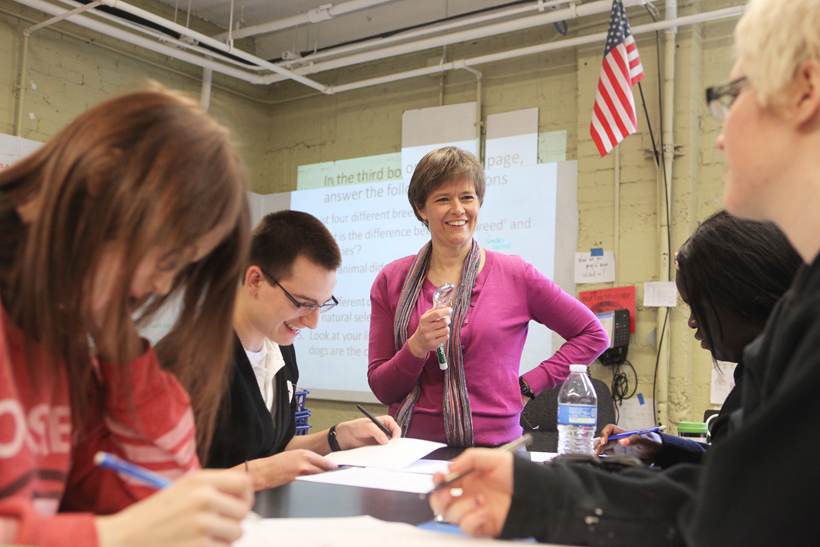News
Fellow Q&A: WW Teaching Fellow Laura Cummings
WW Teaching Fellows come from many different backgrounds but are united by a single goal: to teach science, technology, engineering, and math (the STEM fields) to some of the nation’s highest-need students. But what makes these Fellows tick? What inspired them to pursue a career in the classroom? In this WW Perspectives series, we hear from WW Teaching Fellows about what drew them to the program.
Now in her sixth year of teaching, Laura Cummings made her career change to the classroom as a 2009 Indiana WW Teaching Fellow inspired by a love of science and excellent mentors. She is currently a science teacher at Herron High School in Indianapolis, In.
WW Perspectives: What drew you to teaching chemistry as a career?
Laura Cummings: I was introduced to the baking soda/vinegar reaction by my fifth-grade science teacher and was fascinated. I had the good fortune to have a terrific high school chemistry teacher and was able to take Super Saturday classes at Purdue in high school. In that program we did labs (I distinctly remember the iodine clock reaction) in one of the teaching laboratories on campus.
WWP: Was there any reason you chose to attend the University of Indianapolis?
LC: I first started teaching when I was 24 as an instructor at a university, and while I had a research-based graduate degree in biochemistry, I had almost no education in how to teach. When my students were writing completely bewildering answers to things I thought were obvious, I sought out a graduate student, Gordon Mendenhall, who had been a high school teacher for 20 years. He turned out to be a wonderful mentor and I learned a great deal about teaching from him. Later, he started teaching at the University of Indianapolis, so I knew their program must be good. I was right: they have an excellent program.
WWP: What do you think was the best preparation that you received for the realities of classroom teaching?
LC: I had taught at the university level for three years and had taught preschool music for 10 years as I raised my four children. Even with that background, going into teaching high school was a completely new experience. Observing in a high school daily from the beginning of the year [during clinical placement as a WW Teaching Fellow] and working gradually into teaching students was absolutely wonderful preparation. There were three excellent teachers at the high school who were generous with their knowledge and time. Having strong content knowledge is one thing. Running a classroom is another. I remember collecting my first assignment and sitting on the floor with 180 papers around me. My mentor teacher was lovingly chuckling at me as he watched me realize I’d have to come up with a better system for organizing so many papers.
WWP: What matters most to you about your students?
LC: That they realize that chemistry is everywhere (don’t fall for the “all natural! no chemicals!!” marketing) and that it is something they can understand and use on a daily basis to help make their lives better. I want them to be curious life-long learners.
WWP: What’s the most rewarding part of the program so far for you?
LC: I feel as if I am making a difference. That’s such an overused phrase in some ways, but it is true: when I read about challenges with teenagers or with education I know that I am actively engaged with many wonderful students and am doing the best I can to help them learn how to negotiate a complex world.
WWP: What would you say to someone who’s considering becoming a Woodrow Wilson Teaching Fellow?
LC: This is one of the best programs I’ve seen for preparing teachers. Thanks to the year spent in classrooms observing and gradually taking on the reins yourself, you won’t find yourself in front of the classroom with minimal training. You’ll have observed in many schools, and you will have met many teachers in schools who can be your role models as you discover who you are as a teacher. You’ll have far more resources at your disposal so you won’t rely simply on internet searches as you lesson plan. You’ll have seen many schools in action throughout the school year so you will know the range of possibilities.
It’s not a 40 hour per week career. Don’t sign up to be a Fellow if you want to work only 8 to 5. I’ve seen new teachers be surprised at the hours it requires. The rewards of helping kids grow to be wonderful adults are worth it.
Interviews have been edited for length and clarity.


